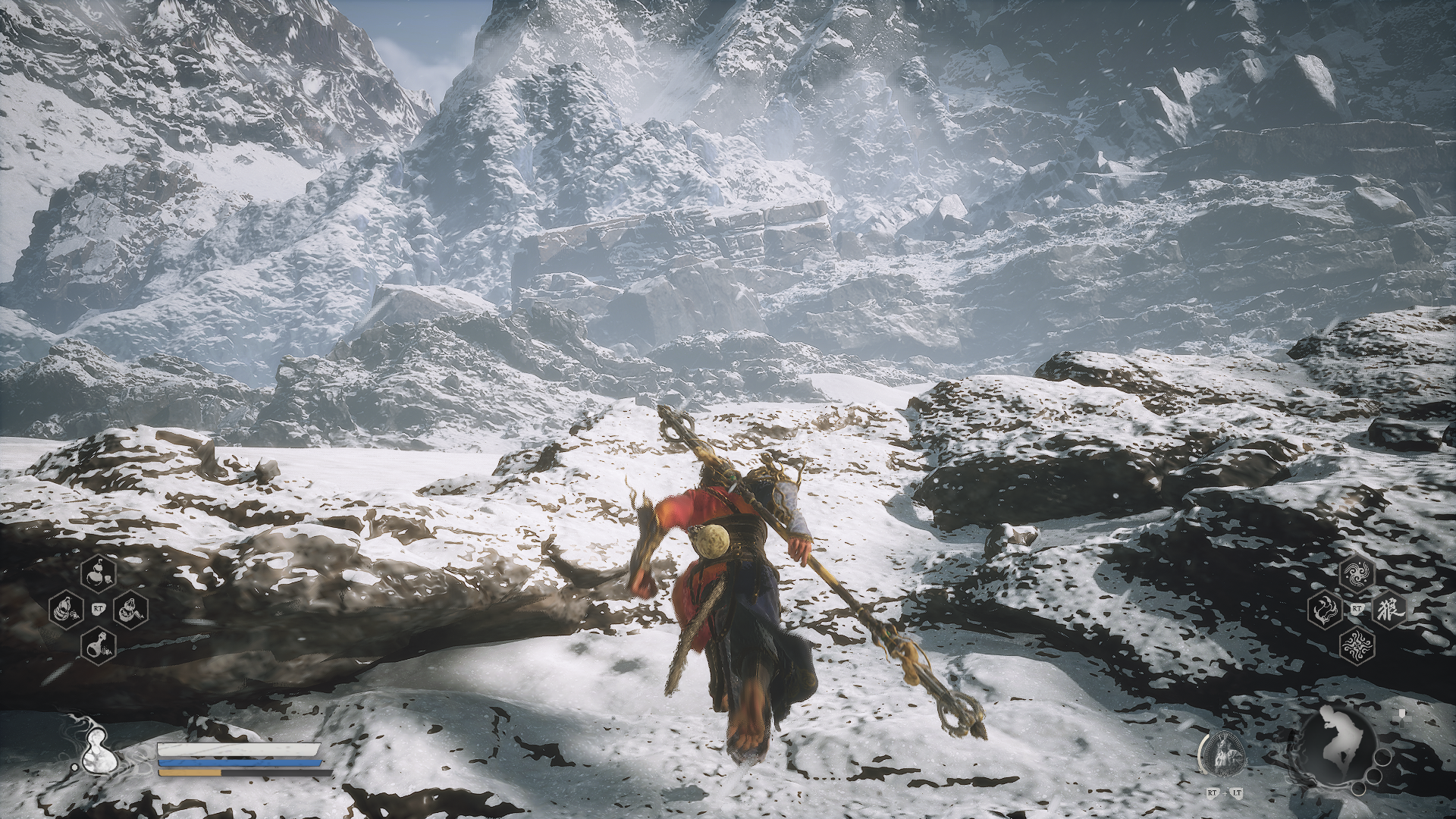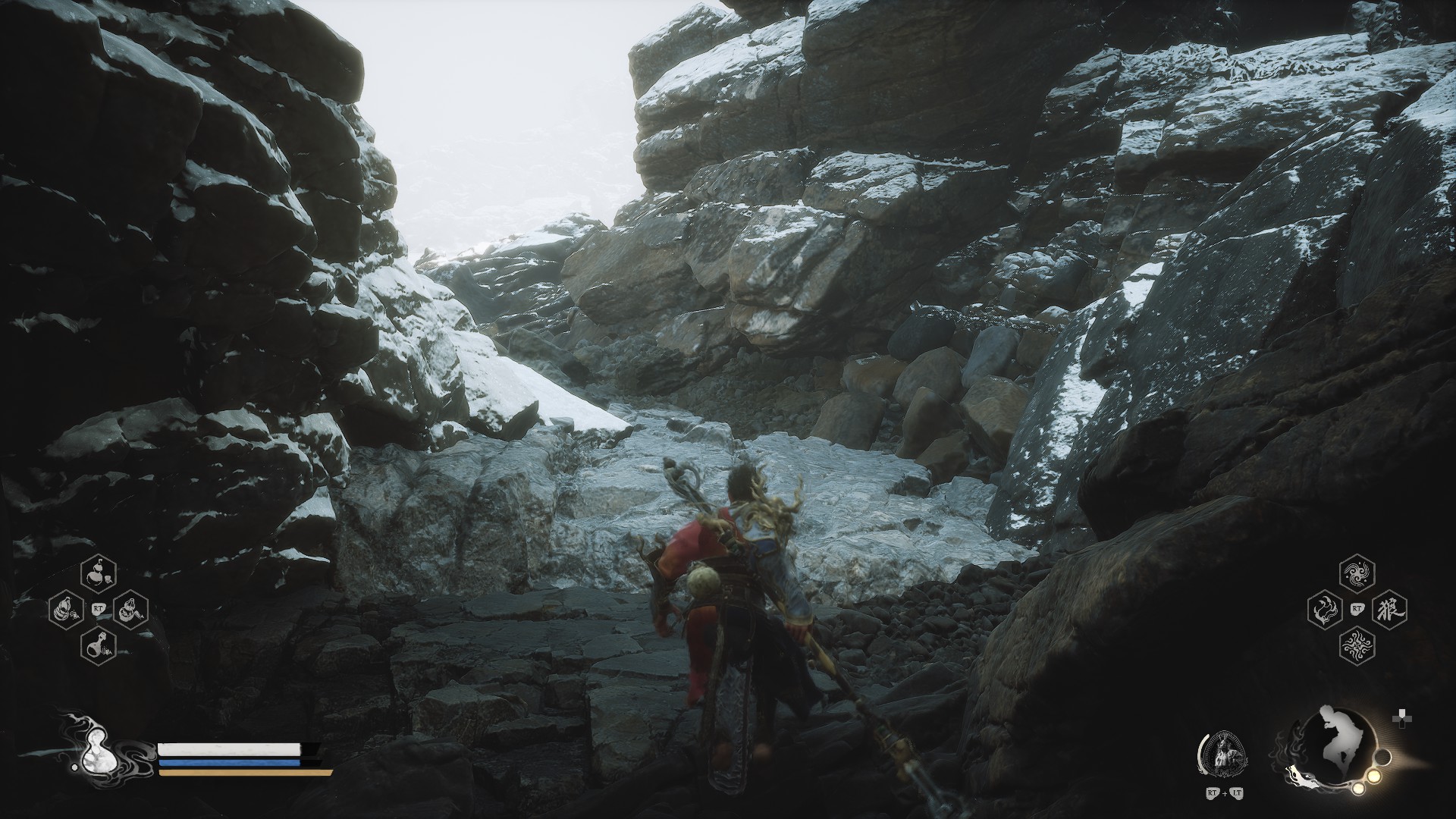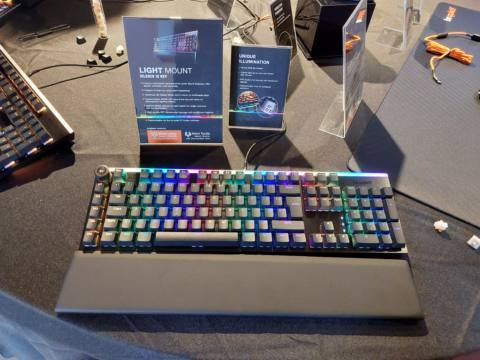For the four of you who haven’t bought it yet, Black Myth Wukong is a fun Soulslike riff on Journey to the West where you play as a delightfully deadly monkey. Our review gave it 87, a score PC Gamer doesn’t often slap on bad games. Wukong is at its best when it throws a spectacular boss fight your way and you get the satisfaction of taking it down with a big whacky stick and several gloriously OTT spells. Conjuring three clones of myself and watching my monkey doppelgangers go absolutely ape on a boss is yet another power fantasy ticked off the ol’ bucket list.
Wukong is also, even by 2024 standards, eye-poppingly gorgeous. I had to turn the graphical settings down a little so my gaming laptop would stop screaming and it still looked spectacular. Lush green forests and blinding-white snowy mountains are game location tropes nearly as old as Pong’s paddles, but that’s a lot easier to ignore when they look this stunning. Until you try exploring them properly and discover how hemmed in you actually are.
Wukong is absolutely infested with invisible walls. Tedious, immersion-breaking barriers that successfully slam the brakes on the fun of exploration. This is a game with 91 bosses and some of its best bouts lurk off the critical path. Same goes for crucial crafting materials, treasures, and meditation spots that presumably grant you serenity (yawn) and an extra skill point (yay!).
Basically, it’s stuffed with motivation to explore, even though it doesn’t give you a map. I don’t think the repetitive level design is nearly memorable enough to get away with being mapless (and it seems at least 30,000 people agree with me) but I begrudgingly accept that as a design choice. What I can’t get past—literally—is nonsense like this doorway:

What’s behind these doors? An epic boss fight? A powerful new weapon? Feminist propaganda I’ll never know because there’s an invisible wall blocking you from passing through that massive opening. Who thought putting an invisible barricade in an open doorway was a good idea That’s the game design equivalent of putting extra lives in a bottle labeled “Poison: Extra Fatal” or hiding an NPC you need to save in a bright red barrel.
Wukong didn’t invent this ancient problem of course, but it’s disappointing to see it making a comeback in a big-budget 2024 release. These days developers prefer subtler smoke and mirrors to disguise limitations, like making you squeeze through gaps in walls to hide loading times. That one’s getting pretty old too, but I’ll take it over the time I trudged across a frozen lake in Wukong, only to discover that land mass in the distance was nothing but a pretty screensaver. I spent the long walk back across the lake inventing new swear words. Why would I want to search this world for secrets when I know this tedium will too often be my reward?

I can see where the temptation to try and get away with this horseshit comes from. Putting visible barriers in place can make a game world look smaller on the surface. Yet naturally, when I slam into invisible walls, the world feels both significantly smaller and more artificial. I’m not trying to pick on Wukong specifically for this for any nefarious reason. I’m more concerned that, in a year where great Soulslikes have started to break out of FromSoftware’s shadow by doing their own thing, we might be seeing the beginning of Elden Ring’s influence, and not for the better.
If Soulslike developers start thinking that they now need to match or at least bluff the scale of an open world to compete, we’re going to see a lot more invisible walls and pointless empty space. One of the things that makes Elden Ring so outstanding is how carefully crafted its world is despite its considerable size, and how much of it actually can be interacted with (it also has a map hint hint). It’s a staggering achievement from an experienced studio at the height of its powers. If you think your debut Soulslike can be of a similar scale, or pretend to be bigger than it is, and match/surpass that for quality, then you’re either incredibly brave or a bigger fan of tragic hubris than [insert clever reference to dark souls lore that will make about three awful people feel incredibly smug for getting it here].
Please don’t leave this thinking Black Myth: Wukong isn’t worth your time. I’d hate for this op-ed to result in all 10 million+ copies being refunded and the game becoming one of 2024’s biggest flops. It’s a charismatic, surprisingly funny, charming adventure with some terrific boss fights and an outstanding power set. Being able to freeze enemies in time and get some incredibly cheap smacks in is a constant joy. And the skill that leaves a little explosive shadow of yourself when you time a dodge just right is the inspired dose of Bayonetta injected into a Soulslike that I’ve always dreamed of.

But crucially these are standout features because they’re not in FromSoftware’s games. Copy that studio’s homework too closely and you end up with something forgettably generic at best, and downright awful at worst. I still haven’t forgiven Lies of P’s jump controls, wherein you had to hold down the run button and then click the analogue stick (what). They’re the direct result of a developer looking at OG Dark Souls’ crap jump controls and going ‘yep, no notes’. And thus one of FromSoftware’s weirdest design decisions was given a grim second life.
Wukong thankfully has a nice, sensible dedicated jump button, albeit one that you use to constantly leap face-first into those sodding invisible walls (every screenshot in this piece is me running into one, by the way, though it’s oddly tricky to capture invisibility in photos). Fat chance of this happening, but I’d love the inevitable sequel to be an unashamedly smaller scale Soulslike that leans into the outstanding, creative spellcraft that is this game’s strength. At the very least, how about a spell that lets us tear down those invisible walls for good?






